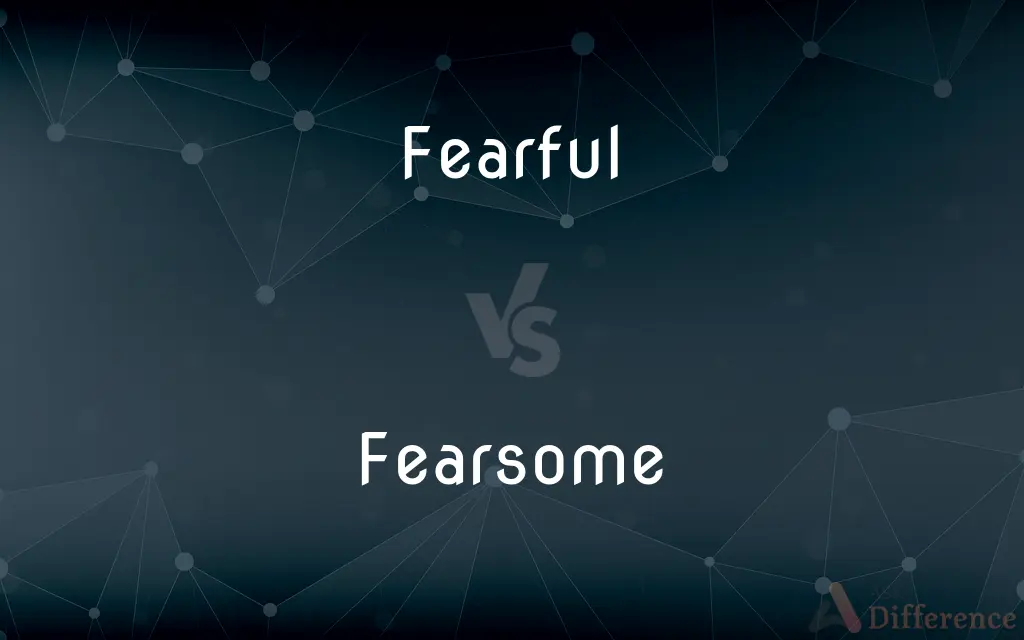Fearful vs. Fearsome — What's the Difference?
By Tayyaba Rehman & Urooj Arif — Updated on April 6, 2024
Fearful describes someone who feels fear or anxiety, while fearsome indicates something that inspires fear due to its formidable nature.

Difference Between Fearful and Fearsome
Table of Contents
ADVERTISEMENT
Key Differences
Fearful refers to an emotional state characterized by apprehension, anxiety, or dread. It often describes individuals who are easily scared or are experiencing fear at a particular moment. On the other hand, fearsome is used to describe entities, such as animals, people, or situations, that inspire fear because of their appearance, strength, or potential for causing harm. This term underscores the capacity to instill fear in others, not the experience of fear itself.
While a fearful person might avoid certain situations or challenges due to their anxieties, a fearsome opponent in sports or a fearsome predator in the wild is regarded with caution or awe due to their perceived threat or power. The key distinction lies in the perspective of fear; it is either felt internally or elicited in others.
In literature, a fearful character may struggle with internal conflicts, insecurities, or external challenges that push them to face their fears. Conversely, a fearsome character often embodies the obstacle or antagonist, presenting a formidable challenge to others due to their menacing qualities or reputation.
The handling of fear varies greatly between being fearful and encountering something fearsome. A fearful individual might seek comfort, reassurance, or strategies to overcome their fears. Meanwhile, facing something fearsome may require courage, preparation, or avoidance, depending on the nature of the threat and the context in which it is encountered.
The term fearful is introspective, highlighting an individual's personal experience with fear, whereas fearsome is projective, emphasizing the ability to provoke fear in others through one's presence or actions.
ADVERTISEMENT
Comparison Chart
Definition
Experiencing fear, anxiety, or apprehension.
Inspiring fear due to formidable qualities.
Perspective
Internal; relates to one's own feelings of fear.
External; relates to the capacity to induce fear.
Usage
Describes individuals who feel or exhibit fear.
Describes things or beings that instill fear in others.
Examples
A fearful child during a thunderstorm.
A fearsome beast guarding the entrance.
Responses
Seeking comfort, avoidance, or overcoming fear.
Preparation, courage, or awe in facing the threat.
Compare with Definitions
Fearful
Easily frightened or feeling fear.
The fearful rabbit hid at the slightest sound.
Fearsome
Inspiring fear or respect through being impressively powerful.
The fearsome waves crashed against the ship.
Fearful
Showing fear or timidity.
His fearful glance revealed his insecurity.
Fearsome
Extremely severe or harmful.
They faced fearsome consequences for their actions.
Fearful
Causing or likely to cause someone to be afraid.
The haunted house looked dark and fearful.
Fearsome
Formidable in nature or appearance.
The soldier had a fearsome reputation.
Fearful
Full of apprehension or anxiety.
She was fearful of the outcome of the medical test.
Fearsome
Capable of causing fear.
The fearsome dragon terrorized the village.
Fearful
Expecting something bad; worried.
They were fearful for their safety during the storm.
Fearsome
Eliciting fear by being impressively large, powerful, intense, or capable.
The athlete's fearsome strength amazed the crowd.
Fearful
Experiencing fear; frightened
Fearful about losing one's job.
Fearful of a scornful response.
Fearsome
Causing or capable of causing fear
"The Devil is a fearsome enemy" (Jimmy Breslin).
Fearful
Inclined to feel anxiety or apprehension; timid; nervous.
Fearsome
Fearful; timid.
Fearful
Indicating anxiety or fear
"Sare faltered, a fearful look clouding her face" (Donna Morrisey).
Fearsome
Frightening, especially in appearance.
Fearful
Causing or capable of causing fear; frightening
A fearful howling.
Fearsome
Fearful, frightened
Fearful
Extreme, as in degree or extent. Used especially of something negative
A fearful blunder.
Fearful poverty.
Fearsome
Frightful; causing fear.
Fearful
Frightening; causing fear.
Fearsome
Easily frightened; timid; timorous.
Fearful
Tending to fear; timid.
A fearful boy
Fearsome
Causing fear or dread or terror;
The awful war
An awful risk
Dire news
A career or vengeance so direful that London was shocked
The dread presence of the headmaster
Polio is no longer the dreaded disease it once was
A dreadful storm
A fearful howling
Horrendous explosions shook the city
A terrible curse
Fearful
(dated) Terrible; shockingly bad.
Fearful
Frightened; filled with terror.
Fearful
(dialect) Extremely; fearfully.
Fearful
Full of fear, apprehension, or alarm; afraid; frightened.
Anxious amidst all their success, and fearful amidst all their power.
Fearful
Inclined to fear; easily frightened; without courage; timid.
What man is there that is fearful and faint-hearted?
Fearful
Indicating, or caused by, fear.
Cold fearful drops stand on my trembling flesh.
Fearful
Causing fear or dread or terror;
The awful war
An awful risk
Dire news
A career or vengeance so direful that London was shocked
The dread presence of the headmaster
Polio is no longer the dreaded disease it once was
A dreadful storm
A fearful howling
Horrendous explosions shook the city
A terrible curse
Fearful
Lacking courage; ignobly timid and faint-hearted;
Cowardly dogs, ye will not aid me then
Fearful
Extremely distressing;
Fearful slum conditions
A frightful mistake
Suffered terrible thirst
Fearful
Timid by nature or revealing timidity;
Timorous little mouse
In a timorous tone
Cast fearful glances at the large dog
Fearful
Experiencing or showing fear;
A fearful glance
Fearful of criticism
Common Curiosities
Is fearsome always negative?
Not necessarily. While fearsome often describes threats, it can also reflect admiration for someone's formidable abilities or strength.
How does literature use the concepts of fearful and fearsome?
Literature uses these concepts to develop characters and plotlines, with fearful characters facing internal battles and fearsome characters or elements presenting external challenges.
Can a situation be fearsome?
Yes, situations can be fearsome if they pose significant danger or difficulty, such as a fearsome storm or a fearsome challenge.
Is being fearful a weakness?
Feeling fear is a natural human emotion and not inherently a weakness. It can become problematic if it interferes with daily life, but it can also be a source of motivation to confront and overcome challenges.
Can an object be described as fearsome?
Yes, objects can be described as fearsome if they present a formidable appearance or imply a potential threat, such as a fearsome weapon.
How can I overcome being fearful?
Overcoming fear can involve exposure to feared situations in a controlled manner, seeking support, and building confidence through positive experiences.
Can fearfulness be beneficial?
Yes, being fearful can be beneficial as it can prompt caution and protective behaviors in potentially dangerous situations.
How do children typically respond to fearsome things?
Children may respond to fearsome things with fear, curiosity, or fascination, often seeking reassurance from adults.
Can a movie be fearful or fearsome?
A movie can be described as fearsome if it's capable of inducing fear through its content or themes, rather than fearful.
Can a person be both fearful and fearsome?
Yes, a person can be fearful in some contexts, feeling fear or anxiety, and fearsome in others, where they inspire fear due to their actions or demeanor.
Are animals typically fearful or fearsome?
Animals can be both, depending on context. Some animals may appear fearsome due to their size or strength, while others may be fearful due to threats in their environment.
What makes a story fearsome?
A story may be considered fearsome due to its suspenseful, threatening, or horror elements that evoke fear in the audience.
How can I make my pet less fearful?
Making a pet less fearful involves gentle socialization, positive reinforcement, and creating a safe, comforting environment.
Are fearsome creatures always real?
Fearsome creatures can be both real and fictional, often playing roles in myths, legends, and storytelling to embody fear or moral lessons.
How do fearsome leaders affect their followers?
Fearsome leaders may command respect or obedience through intimidation, but this can also lead to resentment or fear-based decision-making among their followers.
Share Your Discovery

Previous Comparison
Knowing vs. Being
Next Comparison
Mall vs. BazaarAuthor Spotlight
Written by
Tayyaba RehmanTayyaba Rehman is a distinguished writer, currently serving as a primary contributor to askdifference.com. As a researcher in semantics and etymology, Tayyaba's passion for the complexity of languages and their distinctions has found a perfect home on the platform. Tayyaba delves into the intricacies of language, distinguishing between commonly confused words and phrases, thereby providing clarity for readers worldwide.
Co-written by
Urooj ArifUrooj is a skilled content writer at Ask Difference, known for her exceptional ability to simplify complex topics into engaging and informative content. With a passion for research and a flair for clear, concise writing, she consistently delivers articles that resonate with our diverse audience.














































